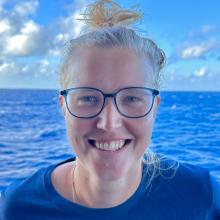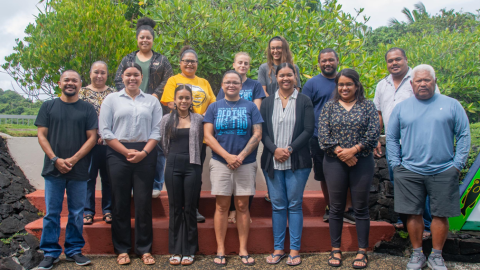
Lucy Dickie
Tell us about your work/research. What kinds of things do you do?
My work is focused on engaging the different communities in Palau with all of PICRC's work and research. As such, it's hugely varied. One day, I'll be at my desk, writing press releases and social media content on the Palau National Marine Sanctuary. The next day, I'll be making a school visit to carry out an ocean acidification workshop or at a community fair talking about mangrove ecosystems. And the next day, I'll be SCUBA diving with researchers to take photos of their work on a coral reef.
What sparked your initial interest in your career?
Growing up, I was always exploring the estuary and sand dunes close to where I lived. I was also a bit of a nerd who liked science class and school camps. I was initially focused on studying marine biology but I found that I didn't want to be a scientist. Moving into the science communication space, has allowed me to still be involved with marine science research while working in a profession that I really enjoy.
Who influenced you or encouraged you the most?
Many of my lecturers and tutors throughout my time studying marine biology and science communication were immensely skilled and passionate about what they did and this really helped shape my career.
What element of your work/study do you think is the most fascinating?
Whenever I'm out in Palau's ocean, I'm amazed by how vibrant the coral reefs and mangroves are. Going out into these ecosystems and documenting how healthy they are is one of the best parts of my job. I never know what I'll find!
How did you get involved with the Ocean Exploration Trust?
The E/V Nautilus will be visiting Palau in October and November 2024 and several members of PICRC will be onboard as they conduct deep-sea research in the Palau National Marine Sanctuary. It's through this collaboration that I've become involved with the Ocean Exploration Trust and I was very lucky to be signed up for this earlier expedition.
What other jobs led you to your current career?
When I was studying Science Communication, I worked as mentor at the University of Otago's Science Academy. Around 60 high school students from all over New Zealand would visit the University for two weeks of the year, in January and July. They attended multiple different labs throughout the week on marine science, genetics, computer science, and more, as well as workshops on science communication. These camps really showcased to me the importance of science education outside of a traditional classroom setting. I also spent many summers working as a tour guide around southern New Zealand, leading groups on foot or by kayak to see penguins and albatross. Now in Palau, I'm surrounded by very different wildlife and ecosystems, but engaging people with the local environment remains the same.
What are your degrees and certifications?
Bachelor of Science in Marine Biology - Victoria University of Wellington 2013; Master of Science Communication - University of Otago 2018
What are your hobbies?
My hobbies very much depend on the water temperature. In Palau, I love SCUBA diving and paddleboarding. Back home in New Zealand, I tend to go hiking and cycling.
What advice would you give someone who wants to have a career like yours?
If you're interested in marine science and the ocean but don't necessarily want to be a researcher, there are many ways to have a career that is science-adjacent. For a career in science communication, I'd recommend trying many different kinds of communication and discovering what you enjoy. Write a blog post or make a social media reel about some cool critter you've found, carry your smartphone or a camera with you wherever you go, and sign up to give a talk about something you're really passionate about. Just find out what you enjoy and go from there.
Expeditions
Lucy participated in the following Ocean Exploration Trust expeditions:

